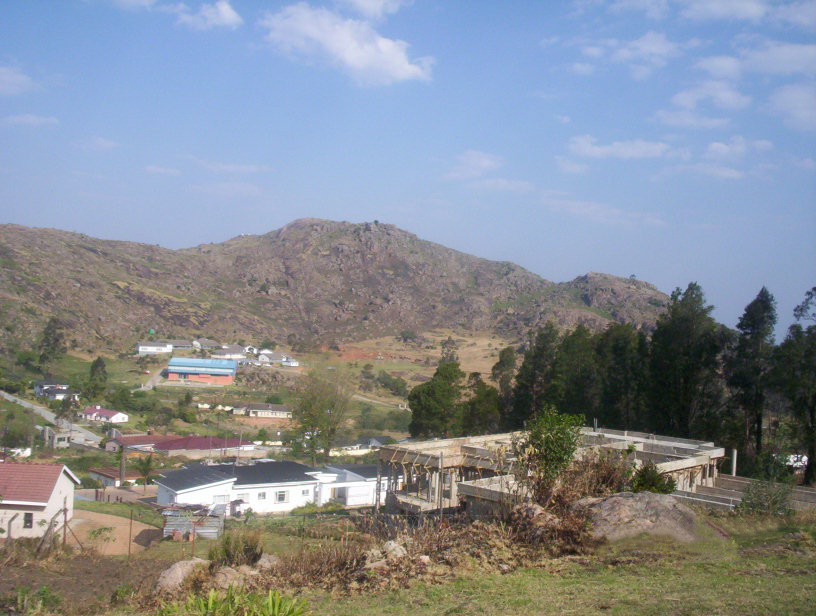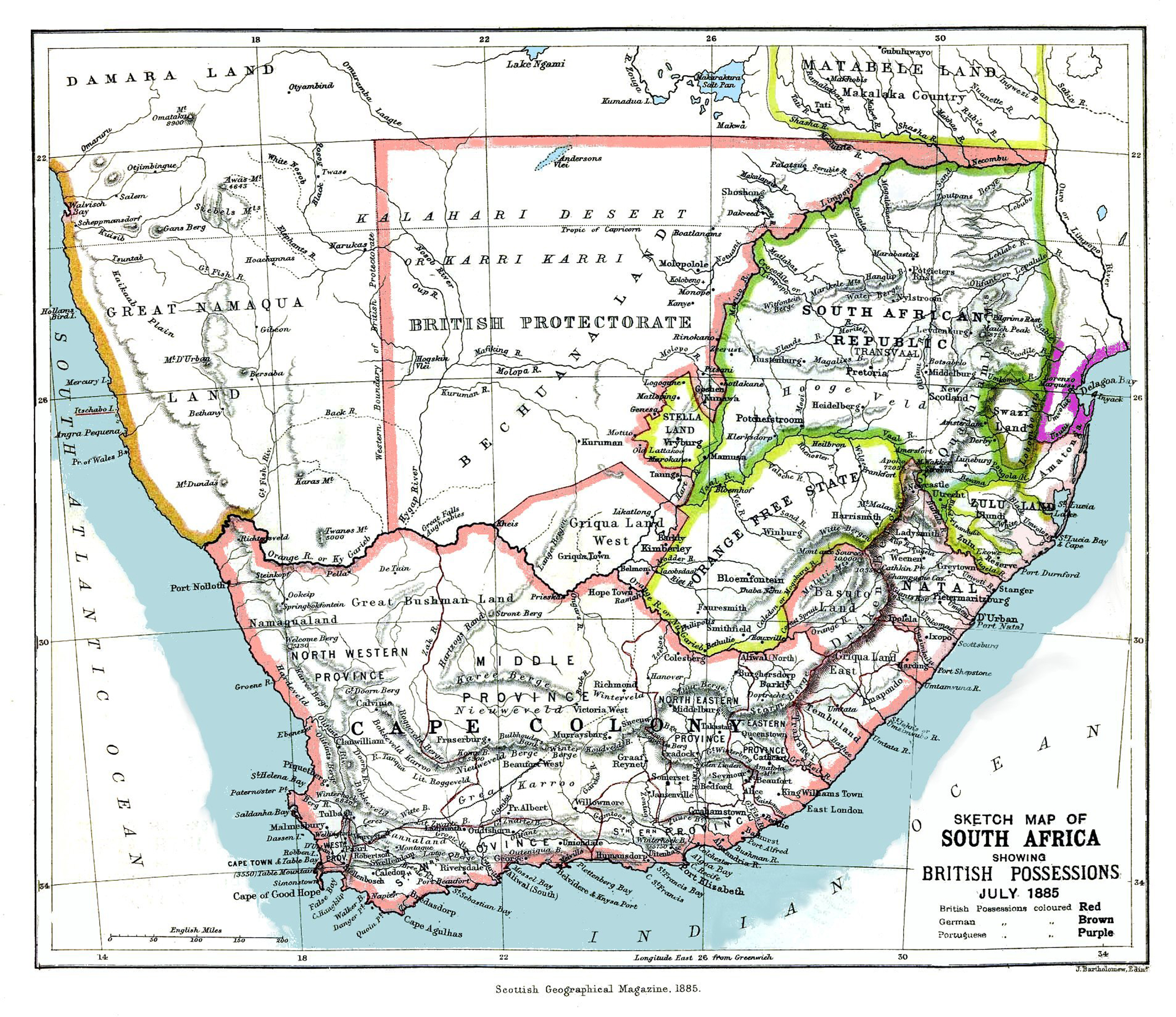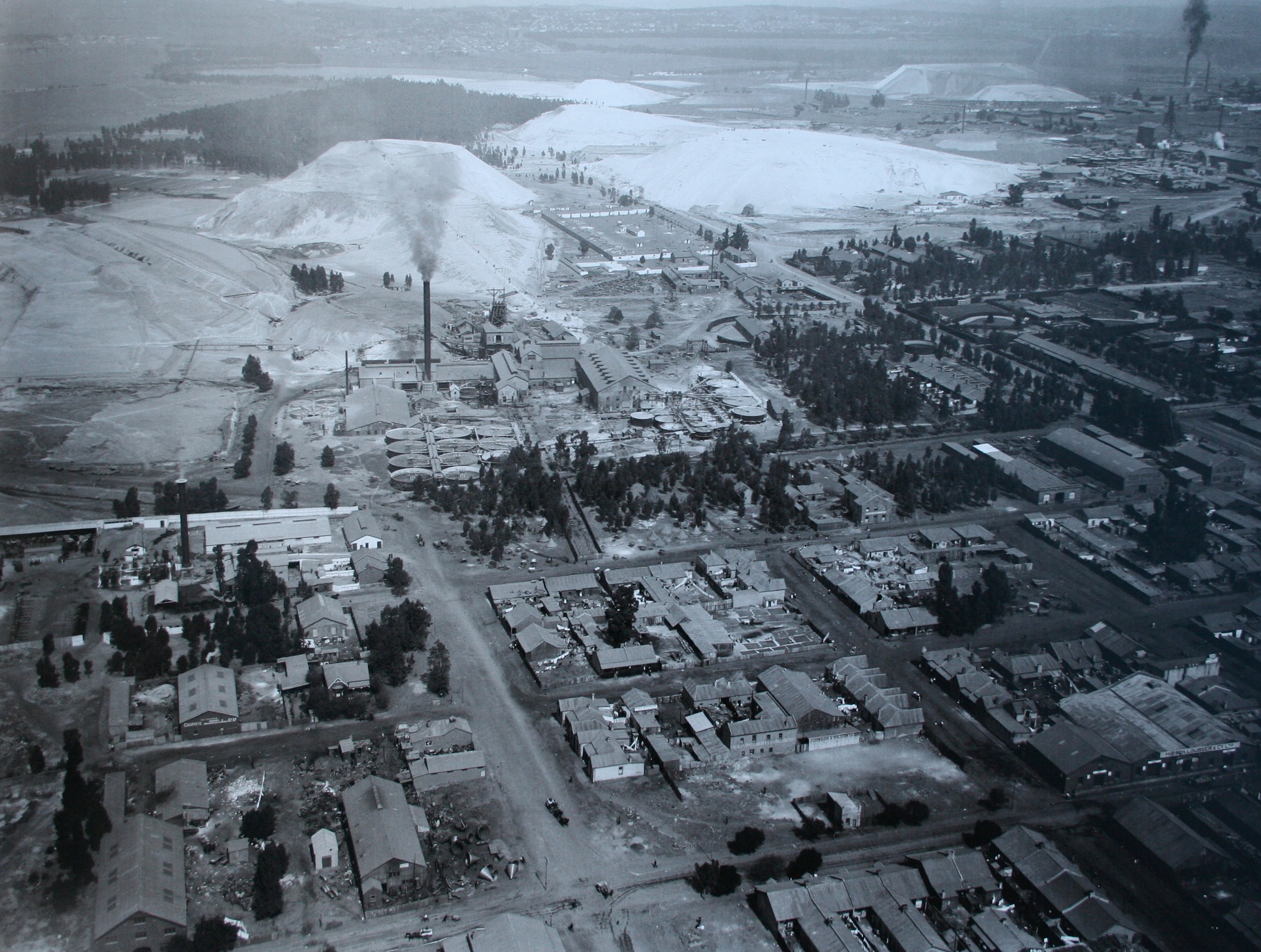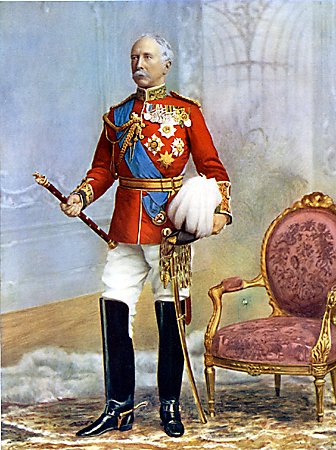|
Dlamini IV
Mbandzeni (also known as Dlamini IV, Umbandine, Umbandeen) (1855–1889) was the King of Swaziland from 1872 until 1889. Ingwenyama Mbandzeni was the son of Mswati II and Nandzi Nkambule. His mother the wife of King Mswati had died when he was still very young. Mbandzeni ascended to the throne after his half brother Ludvonga II died before he could become the king. Ludvonga's death resulted in his mother Inkhosikati Lamgangeni adopting Mbandzeni who was motherless as her son, thus making him King and her the Queen mother of Swaziland. His royal capital was at Mbekelweni. During his kingship Mbandzeni granted many mining, farming, trading and administrative concessions to white settlers from Britain and the Transvaal. The Boers had tricked the king into signing permanent land concesions. The king could not read or write, so the Boers made him sign the concessions with a cross. The king was told that these were not permanent land concessions but the papers themselves stated othe ... [...More Info...] [...Related Items...] OR: [Wikipedia] [Google] [Baidu] |
King Of Swaziland
iNgwenyama (also ''Ingwenyama'') is the title of the male monarch of Eswatini. In English, the title is sometimes translated as King of Eswatini. The iNgwenyama reigns together with the Ndlovukazi, a spiritual leadership position held by the iNgwenyama's mother or another female royal of high status.Kuper, Hilda (1980 947. ''An African Aristocracy. Rank Among the Swazi'' acsimile reprint Africana Publishing Company for the International African Institute. The Ndlovukati may serve as a Regent if the position of Ngwenyama is vacant. ''Ingwenyama'' means "Lion" in Swati but in an honorific sense, as opposed to ''libhubesi'', the usual way of referring to actual lions. The title is sometimes written ''Ingwenyama'', ''iNgwenyama'', or ''ingweinyama'', with the prefix ''i-'' (plural ''ti-'', tiNgweniyama), meaning "the king". The current king is Mswati III, who has reigned since 1986. The annual budget allocated to the King and the royal household amounts to $61 million. Powers ... [...More Info...] [...Related Items...] OR: [Wikipedia] [Google] [Baidu] |
Mbabane
Mbabane (; ss, ÉMbábáne, ) is a city in Eswatini (previously called Swaziland), and is one of the two capitals (along with Lobamba), serving as the executive capital. With an estimated population of 94,874 (2010), it is located on the Mbabane River and its tributary the Polinjane River in the Mdzimba Mountains. It is located in the Hhohho Region, of which it is also the capital. The average elevation of the city is 1,243 meters. It lies on the MR3 road. History The town grew after the nation's administrative centre moved from Bremersdorp (now called Manzini) in 1902. It derives its name from a chief, Mbabane Kunene, who lived in the area when British settlers arrived. Mbabane was founded in 1887 by Mickey Wells, on the spot where the Transvaal-to-Mozambique route crossed the Mbabane river. It was declared the capital of the new Protectorate of Swaziland in 1902. During this time, Mbabane consisted of a few shops, churches and schools founded by white settlers. Black Afric ... [...More Info...] [...Related Items...] OR: [Wikipedia] [Google] [Baidu] |
Portuguese Mozambique
Portuguese Mozambique ( pt, Moçambique) or Portuguese East Africa (''África Oriental Portuguesa'') were the common terms by which Mozambique was designated during the period in which it was a Portuguese Empire, Portuguese colony. Portuguese Mozambique originally constituted a string of Portuguese possessions along the south-east African coast, and later became a unified colony, which now forms the Republic of Mozambique. Portuguese trading settlements—and later, colonies—were formed along the coast and into the Zambezi basin from 1498 when Vasco da Gama first reached the Mozambican coast. Lourenço Marques (explorer), Lourenço Marques explored the area that is now Maputo Bay in 1544. The Portuguese increased efforts for occupying the interior of the colony after the Scramble for Africa, and secured political control over most of its territory in 1918, facing the resistance of Africans during the process. Some territories in Mozambique were handed over in the late 19th cent ... [...More Info...] [...Related Items...] OR: [Wikipedia] [Google] [Baidu] |
Allister Miller
Lieutenant-Colonel Allister Miller (1892–1951) was a South African aviation pioneer, who contributed significantly to both military and civil aviation in South Africa during the first half of the twentieth century. He originally qualified as an electrical engineer. On the outbreak of World War I in 1914, he joined the British Army, from which he transferred to the Royal Flying Corps as a pilot, in 1915. He fought in the skies over the Western Front (World War I), Western Front in French Third Republic, France and Belgium, and during 1916–17 he returned to Union of South Africa, South Africa on recruiting tours for the RFC. He recruited more than 8,000 volunteers, of whom 2,000 were accepted, most of them as pilots. They were known collectively as "Miller's Boys". On the second recruitment drive, Miller took along two Royal Aircraft Factory B.E.2 aircraft and mechanics to assemble the aircraft in Cape Town. The aircraft were serial numbers A3109 and A3110 built by Wolseley ... [...More Info...] [...Related Items...] OR: [Wikipedia] [Google] [Baidu] |
Pedi People
The Pedi or (also known as the Northern Sotho or and the Marota or ) – are a Southern Africa, southern African ethnic group that speak Pedi or ''Sepedi'', a dialect belonging to the Sotho-Tswana peoples, Sotho-Tswana Ethnolinguistic group, enthnolinguistic group. Northern Sotho is a term used to refer to one of South Africa's 11 official languages. Northern Sotho or Sesotho sa Leboa consist of 33 dialects, of which Pedi is one of them. The BaPedi people are almost exclusively found in South Africa's Points of the compass, northeastern Provinces of South Africa, provinces which are Limpopo, and parts of northern Mpumalanga. There is confusion regarding the distinction between BaPedi people, and tribes referred to Northern Sotho (''Basotho ba Lebowa).'' On the one hand, one military explanation is that the BaPedi people became powerful at one point under a powerful king that ruled over a large piece of land. During this period, a powerful army of the BaPedi conquered small ... [...More Info...] [...Related Items...] OR: [Wikipedia] [Google] [Baidu] |
Transvaal Colony
The Transvaal Colony () was the name used to refer to the Transvaal region during the period of direct British rule and military occupation between the end of the Second Boer War in 1902 when the South African Republic was dissolved, and the establishment of the Union of South Africa in 1910. The borders of the Transvaal Colony were larger than the defeated South African Republic (which had existed from 1856 to 1902). In 1910 the entire territory became the Transvaal Province of the Union of South Africa. History Both the Boer republics, the South African Republic (ZAR) and the Orange Free State were defeated in the Anglo-Boer War and surrendered to the UK. The peace treaty (Treaty of Vereeniging) contained the following terms: # That all burghers of the ZAR and Orange Free State lay down their arms and accept King Edward VII as their sovereign. # That all burghers outside the borders of the ZAR and Orange Free State, upon declaring their allegiance to the King, be transpo ... [...More Info...] [...Related Items...] OR: [Wikipedia] [Google] [Baidu] |
Sir Garnet Wolseley
Field Marshal Garnet Joseph Wolseley, 1st Viscount Wolseley, (4 June 183325 March 1913), was an Anglo-Irish officer in the British Army. He became one of the most influential and admired British generals after a series of successes in Canada, West Africa and Egypt, followed by a central role in modernizing the British Army in promoting efficiency. He served in Burma, the Crimean War, the Indian Mutiny, China, Canada and widely throughout Africa—including his Ashanti campaign (1873–1874) and the Nile Expedition against Mahdist Sudan in 1884–85. Wolseley served as Commander-in-Chief of the Forces from 1895 to 1900. His reputation for efficiency led to the late 19th century English phrase "everything's all Sir Garnet", meaning, "All is in order." Early life and education Lord Wolseley was born into a prominent Anglo-Irish family in Dublin, the eldest son of Major Garnet Joseph Wolseley of the King's Own Scottish Borderers (25th Foot) and Frances Anne Wolseley (''née'' Smi ... [...More Info...] [...Related Items...] OR: [Wikipedia] [Google] [Baidu] |
Zulu Kingdom
The Zulu Kingdom (, ), sometimes referred to as the Zulu Empire or the Kingdom of Zululand, was a monarchy in Southern Africa. During the 1810s, Shaka established a modern standing army that consolidated rival clans and built a large following which ruled a wide expanse of Southern Africa that extended along the coast of the Indian Ocean from the Tugela River in the south to the Pongola River in the north. A bitter civil war in the mid-19th century erupted which culminated in the 1859 Battle of Ndondakusuka between the brothers Cetshwayo and Mbuyazi. In 1879, a British force invaded Zululand, beginning the Anglo-Zulu War. After an initial Zulu victory at the Battle of Isandlwana in January, the British regrouped and defeated the Zulus in July during the Battle of Ulundi, ending the war. The area was absorbed into the Colony of Natal and later became part of the Union of South Africa. History Rise under Shaka Shaka was the illegitimate son of Senzangakhona, Chief of the ... [...More Info...] [...Related Items...] OR: [Wikipedia] [Google] [Baidu] |
Boers
Boers ( ; af, Boere ()) are the descendants of the Dutch-speaking Free Burghers of the eastern Cape frontier in Southern Africa during the 17th, 18th, and 19th centuries. From 1652 to 1795, the Dutch East India Company controlled this area, but the United Kingdom incorporated it into the British Empire in 1806. The name of the group is derived from "boer", which means "farmer" in Dutch and Afrikaans. In addition, the term also applied to those who left the Cape Colony during the 19th century to colonise in the Orange Free State, Transvaal (together known as the Boer Republics), and to a lesser extent Natal. They emigrated from the Cape to live beyond the reach of the British colonial administration, with their reasons for doing so primarily being the new Anglophone common law system being introduced into the Cape and the British abolition of slavery in 1833. The term ''Afrikaners'' or ''Afrikaans people'' is generally used in modern-day South Africa for the white Afri ... [...More Info...] [...Related Items...] OR: [Wikipedia] [Google] [Baidu] |
Theophilus Shepstone
Theophilus Shepstone Sir Theophilus Shepstone (8 January 181723 June 1893) was a British South African statesman who was responsible for the annexation of the Transvaal to Britain in 1877. Early life Theophilus Shepstone was born at Westbury-on-Trym near Bristol, England. When he was three years old his father, the Rev. William Theophilus, emigrated to Cape Colony. Young Shepstone was educated at the native mission stations at which his father worked, and the lad acquired great proficiency in the indigenous languages of South Africa, a circumstance which determined his career. In the Xhosa War of 1835 he served as headquarters interpreter on the staff of the governor, Sir Benjamin d'Urban, and at the end of the campaign remained on the frontier as clerk to the agent for the local tribes. Natal In 1838 he was one of the party sent from Cape Colony to occupy Port Natal on behalf of Britain. This force was recalled in 1839 when Shepstone was appointed British resident among the ... [...More Info...] [...Related Items...] OR: [Wikipedia] [Google] [Baidu] |
Cetshwayo
King Cetshwayo kaMpande (; ; 1826 – 8 February 1884) was the king of the Zulu Kingdom from 1873 to 1879 and its Commander in Chief during the Anglo-Zulu War of 1879. His name has been transliterated as Cetawayo, Cetewayo, Cetywajo and Ketchwayo. Cetshwayo consistently opposed the war and sought fruitlessly to make peace with the British, and was defeated and exiled following the Zulu defeat in the war. He was later allowed to return to Zululand, where he died in 1884. Early life Cetshwayo was a son of Zulu king Mpande and Queen Ngqumbazi, half-nephew of Zulu king Shaka and grandson of Senzangakhona. In 1856 he defeated and killed in battle his younger brother Mbuyazi, Mpande's favourite, at the Battle of Ndondakusuka. Almost all Mbuyazi's followers were massacred in the aftermath of the battle, including five of Cetshwayo's own brothers. Following this he became the ruler of the Zulu people in everything but name. He did not ascend to the throne, however, as his father was ... [...More Info...] [...Related Items...] OR: [Wikipedia] [Google] [Baidu] |
Mpande
Mpande kaSenzangakhona (1798–18 October 1872) was monarch of the Zulu Kingdom from 1840 to 1872. He was a half-brother of Sigujana, Shaka and Dingane, who preceded him as Zulu kings. He came to power after he had overthrown Dingane in 1840. His reign was relatively lengthy at 32 years, but for the latter part of his reign, he was king in name only. His son Cetshwayo became ''de facto'' ruler in 1856. Mpande himself claimed that he preferred a quiet life and that he had been forced to become king. Biography Early career Mpande was born in Babanango, Zululand, the son of Senzangakhona kaJama (1762–1816) and his ninth wife Songiya kaNgotsha Hlabisa. He was considered a weak man in comparison to his contemporaries. While other half-brothers were eliminated when his brother Dingane assassinated Shaka to become king in 1828, he was allowed to live. Mpande apparently showed no interest in Zulu power politics. Mpande came to prominence when Dingane suffered a catastrophic disast ... [...More Info...] [...Related Items...] OR: [Wikipedia] [Google] [Baidu] |





